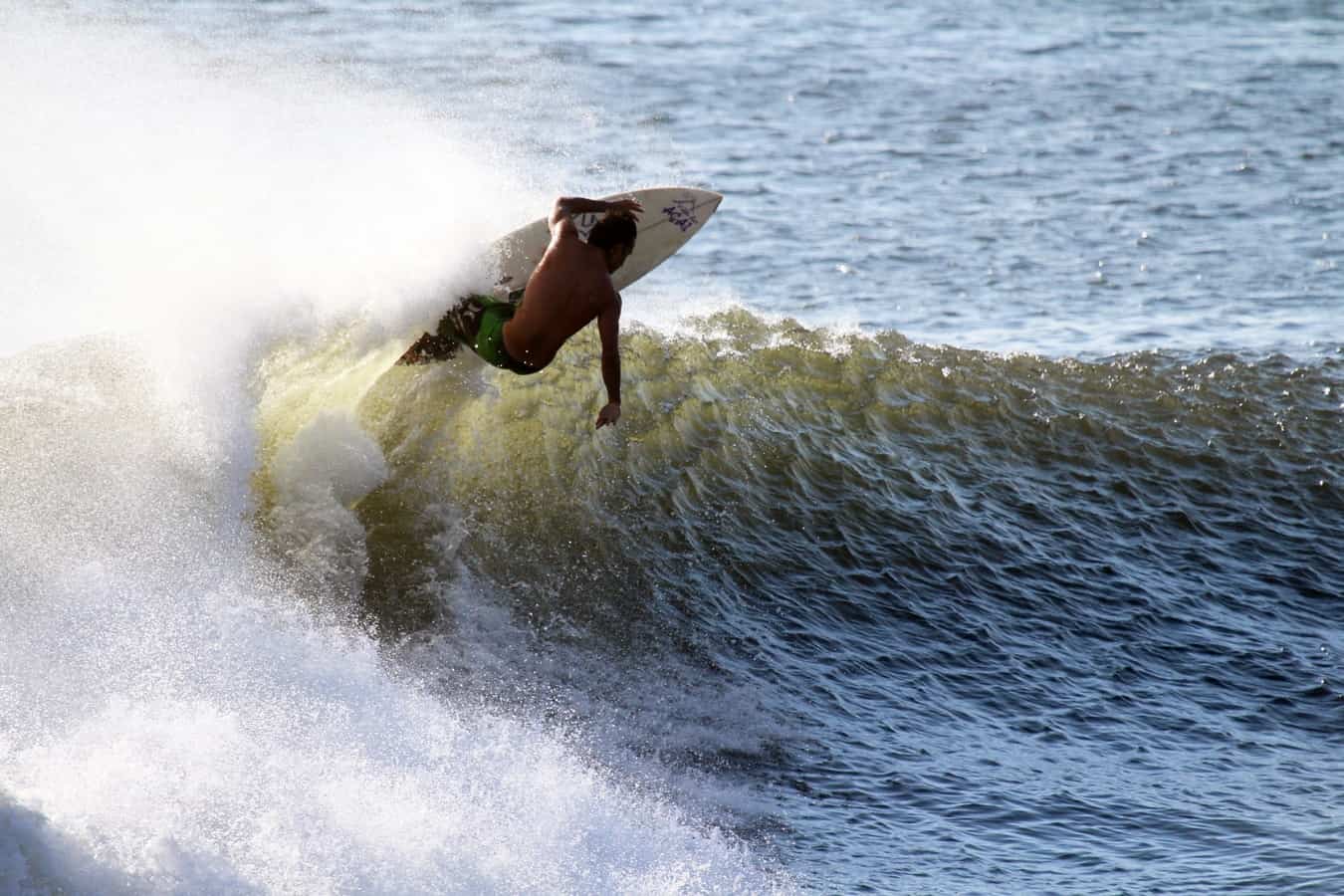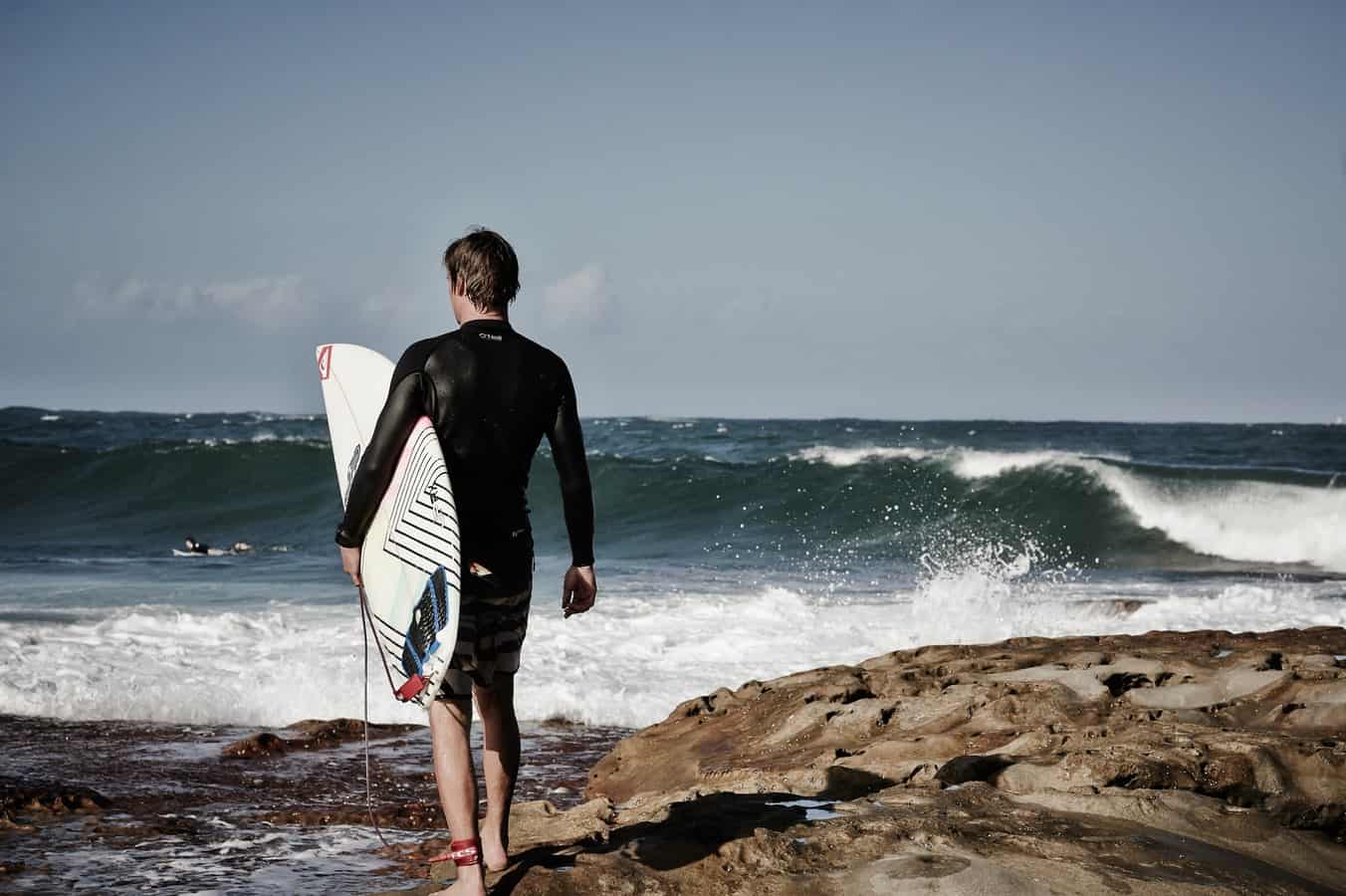When it comes to saying whether surfing a sport or not, there are many things to consider. Especially in this day and age, where the words sport and game are more blurred than ever. But when it comes to determining whether something is a sport or not, there a few concrete rules one needs to abide by.
So is surfing a sport? Surfing is a sport because it’s a physical activity that requires skill and allows individuals to compete against another. Though surfing is more often looked at as a lifestyle that happens to involve activity, the fundamentals principles behind surfing and what it means to surf make it a sport.
How Does One Define A Sport?
Oxford Dictionary defines sport as “an activity involving physical exertion and skill in which an individual or a team competes against another or others for entertainment” So let’s break it down. Surfing certainly involves physical exertion with swimming out, popping up and balancing while riding waves, doing bottom turns and cutbacks. Next is skill. Surfing certainly requires a large amount of skill including balance, timing and swimming ability. The next part of what makes a sport a sport is probably the biggest misconception about surfing. The definition of sport says that to be a sport, the activity must be scored. Believe it or not you can score surfing and individuals do in fact compete against each other in surf competitions.
What’s The Difference Between A Game And A Sport?
The involvement of physical activity is the main differentiator between a game and a sport but even that line is becoming blurred in this modern day and age. However, the words Game and Sport are fundamentally different. A game, by definition involves more than one person while a sport can pertain to an individual’s skills and performance. A sport also has to involve some level of physical activity, which surfing absolutely has.

How Do You Keep Score In Surfing?
If you’ve ever surfed, you’re probably wondering how such a thing could possible be scored. And it’s not a bad question! Basically, in surf competitions, a panel of five judges score each wave on a scale of 1-10. For every scoring ride, the highest and lowest scores are discounted and the surfer receives the average of the remaining three scores. The scoring system is based on the following categories: Commitment and degree of difficulty, innovative and progressive maneuvers, combination of major maneuvers, variety of maneuvers and speed, power and flow.
What Are Surf Competitions?
Surf competitions are events that take place in legendary surf locations like Huntington Beach or Teahupoʻo. Major corporations back the competitions, provide cash prizes and give surfers enormous amounts of exposure. Most major competitions are part of the World Surf League of WSL, which host tours of competitions featuring the biggest names in surfing like John John Florence and Italo Ferreira. These competitions are also where legendary pro surfers like Kelly Slater made a name for themselves. Some especially well known surf competitions include North California’s Maverick’s tournament, The WSL World Tour and Tahiti Pro Teahupoo.
If Surfing Is A Sport Does That Mean I Can Watch Pro-Surfing?
It sure does! You can watch competitions, tournaments, tours or even just footage from pro surfers directly. Most of the major competitions are part of the World Surf League. The best way to watch live pro-surfing competitions is to download the Facebook video app on your smart TV or streaming device and search for “WSL Live.” You can find the Facebook Video App on Apple TV, Amazon Fire, Android TV, Samsung TV, & XBOX TV or on your smartphone.
How Do Surf Competitions Work Exactly?
Basically each surfer must compete in heats, which consist of 2 to 4 surfers at the same time in a pre-determined competition zone. Surfers have between 20 to 30 minutes (this can vary depending on the type of competition) to catch the best waves possible. Every wave they catch is rated on a ten-point scale by a panel of judges and only the two best waves of each surfer is counted, due to all the X-factors when trying to catch a good wave. The final score is out of 20, so if a surfer gets a 20/20 it would mean that he/she had two perfect waves and CRUSHED them.
How Do Pro Surfers Choose Waves In Competitions?
Surfers need to choose their waves wisely because it’s not about the quantity of wave they catch but the quality. They’re carefully choosing what type of wave they want to drop in on for a competition because different waves are scored differently. For instance, a wave like a Pipeline will score barrels higher. The quality of waves that day also matter. Every pro surfer is also an expert wave scout. Judges will determine a scale to judge the surfers based on what is possible according to the waves that particular day. The wave scoring is done with five quality levels in mind: 0-1.9 (Poor), 2-3.9 (Fair), 4-5.9 (Average), 6-7.9 (Good), 8–10 (Excellent).
What Makes Surfers Lose Points In Competitions?
If a surfer drops in on a fellow surfer who has already begun to catch the wave, the judges take away half of the points of its second best wave. This is called “interference”, and is somewhat similar to the scoring system used in sailing competitions minus the race elements. Sometimes, the surfer that is losing the heat can try to bait a rival into committing interference in order to make him lose points. Surf contests are a dice game. The best surfer doesn’t always come out with the trophy because there are too many variables at stake. There’s a lot of heat tactics that surfers can use so it’s not just about being a good surfer, they also need to be super competitive. Also, a maneuver also needs to be fully completed for it to be scored. This means that maneuver can only be scored if the rider emerges with both feet on the board while still being pushed by the force of the wave.
How Does Interference Work In Surfing Competitions?
Surfing competitors can’t always catch the waves they want. Judges always pay close attention to the surfer who took off and gets to his/her feet first. That is why the surfer who is closest to the peak during takeoff needs to be given priority. If other surfers happen to drop in or bump boards then he/she losses the opportunity for that highest scoring wave and loses points. Keep in mind that judges can only score what they see. In case of one mistaken score, an averaging process will be done using the score from the other judges. Competition organizers have to make sure that the contest area is easily viewable, identify the difficult to see areas and inform the surfers properly.
How Much Do Pro-Surfers Make From Competitions?
To answer this question, let’s first look at the major surfing events. The Vans US Open of Surfing for instance, is one of the biggest surfing competition in the world. The competition has a first place cash prize in the $30,000-$50,000 range. So you might be thinking, if the average surfer earns between $250,000-$400,000 a year, how many competitions are they winning? The truth is you don’t have to win a large amount of competitions to be in the upper echelon of pro surfers. In surfing, how brands view you matters just as much as the competitions you win.
Is Surfing Still A Sport If I Don’t Compete
Like skating or snowboarding or even sailing, the fact that you personally don’t keep score does not make the activity you’re doing not a sport. This can be a tricky concept for individual sports but the main thought behind it is that when you’re surfing by yourself, you are also competing against yourself. You’re trying to beat your own internal “score” by catching a wave better than you did yesterday.
Can I Compete At Surfing Even If I Don’t Go Pro?
Yes! There are many amateur tournaments that happen locally. Simply keep your ears and eyes open for local competitions in surf locations near your home. Amateur tournaments can be a great way for getting a feel for how you would fair in the competitive scene.
How Do I Enter An Amateur Surf Competition?
If you have dreams of going pro there’s technically nothing from stopping you from seeing if you can qualify. However, you can also compete in low stakes amateur competitions. Most beach communities hold some type of amateur surf contest with reasonable entry fees in the $45 range like Carlsbad Beach Fest, a community amateur surf competition in Carlsbad, California.
How Do I Enter A Pro Competition?
The short answer is it’s a long journey. The first step is to look up the closest Association of Surfing Professionals region. The ASP has Pro and Junior Pro events that cater to the surfers in every area. By taking advantage of these opportunities, an amateur can test themselves against the skills of other surfers in regional or state amateur events. These events are also a great place to meet some of the traveling pros and even get a chance to compete against world-class talent. Note that, for both the Junior Series and the World Qualifying Series, members must pay yearly dues, individual contest entry fee and travel fees.
A surfer’s finish in each event during a calendar year is assigned a point value, with the higher overall point standing at the end of the year resulting in a higher standing in the following year. Plus, the top 5 surfers from each region will be invited to the World Pro Junior event in Australia, which is the most prestigious event in the world for aspiring surfers. Just look at the finalists over the years and you will see the top-tier pros on the World Championship Tour.
Are There Surf Teams At Schools Like Other Sports?
While surfing is more often a club activity at most high schools, there are some colleges that have the right resources and location to host regular surf practices have official school-backed teams. The most well known college that has a surf team is UC San Diego, which was named the number one surf-friendly school in the nation by Surfer Magazine.
Why Do Many Consider Surfing More Of A Lifestyle Than A Sport?
People often view surfing more as a lifestyle than a sport because it’s pretty impossible to compete against one another in a way that actually keeps score without a formal judge or panel of judges. The surf lifestyle is more about chasing that perfect wave. The slow, the fast, the balance, the waves.

